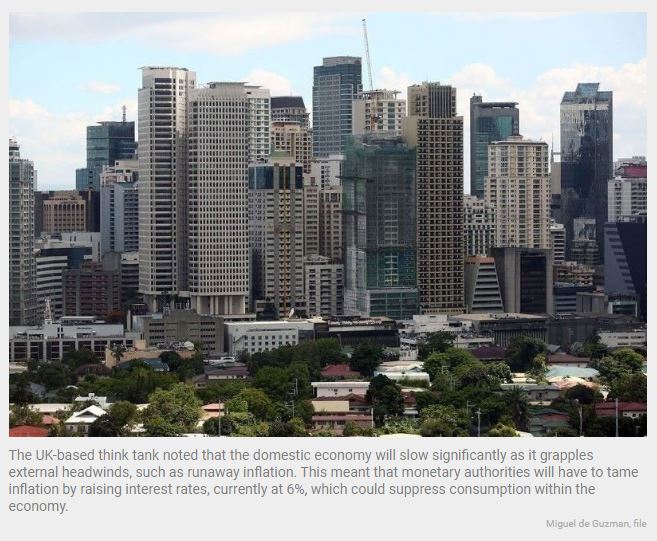Philippines: Tight fiscal space to deter GDP growth as rate hikes bite — Oxford Economics
MANILA, Philippines — A think tank argued that the 2023 budget will hamper the domestic economy’s chances of straddling global recession hurdles, especially since higher borrowing costs could stifle consumption around the country.
UK-based Oxford Economics made the case in a commentary on Wednesday.
“Lack of policy support is a key reason for our below-consensus GDP growth 2023 forecast of 4.1%,” they said.
As it is, the Marcos Jr. administration is projecting the domestic economy to grow 6-7% in 2023. This was a narrower figure, as economic managers put recession fears top of mind when they revised their projection from 6.5-8%.
The UK-based think tank noted that the domestic economy will slow significantly as it grapples with external headwinds, such as runaway inflation. This meant that monetary authorities will have to tame inflation by raising interest rates, currently at 6%, which could suppress consumption within the economy.
In this scenario, the national budget should support growth aspirations. But that might not be the case. The think tank suspected that this year’s budget saw “subdued” increases.
Oxford Economics attributed the modest increase of the spending package, inching up 4.9% compared to the former Duterte administration’s last budget, to trim the country’s fiscal deficit.
This was still in-line with the pronouncements of Finance Secretary Benjamin Diokno, who previously headed the central bank in the previous administration.
But an economic slowdown could dampen government revenues, which the Marcos Jr. administration hopes to turn to as it set its eyes on its growth targets.
The think tank noted revenue expansion will be slower this year, as well as household spending since Filipinos are still reeling from expensive living costs.
“But against a backdrop of economic uncertainty and the need to rebuild savings buffers post-pandemic, much of the extra income may be saved, rather than spent,” Makoto Tsuchiya, assistant economist at Oxford Economics, said.
That said, the think tank spotlighted the fact that priority spending areas, such as education, saw increases, which still supported the Marcos Jr. administration’s medium-term macroeconomic strategy.
Despite the rosy statements, the Marcos Jr. administration would need to get a handle on its debt problem to fatten the gross domestic product. Government data showed the debt pile ballooned 14.4% to P13.42 trillion in 2022, due in part the mammoth borrowing efforts for pandemic response.
“Ideally, fiscal policy would take over the burden of supporting growth. But debt accumulated during the pandemic era means the focus is instead on fiscal consolidation,” Oxford Economics added.
The debt-to-GDP ratio settled at 60.9% in 2022, still above what credit watchers deem manageable.
That said, fiscal consolidation will continue as planned as the Marcos Jr. administration is keen on upgrading the country’s status to an upper-middle economy.
“Emerging economies like the Philippines are susceptible to sovereign credit rating downgrades, which often precedes financial outflows and market turmoil. The risk is particularly important to monitor given the country’s high debt levels currently,” Tsuchiya added.
Source: https://www.philstar.com/business/2023/02/22/2246836/tight-fiscal-space-deter-gdp-growth-rate-hikes-bite-oxford-economics


 Thailand
Thailand




